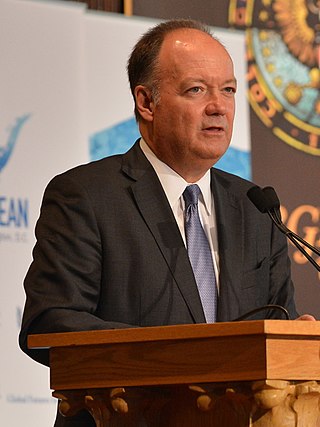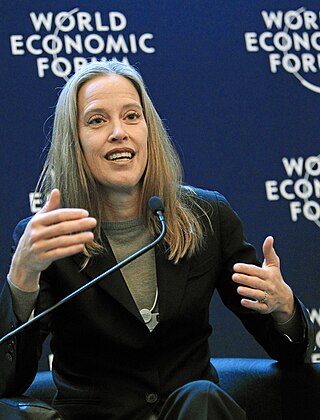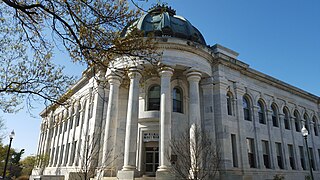
Wilkes-Barre is a city in and the county seat of Luzerne County, Pennsylvania, United States. Located at the center of the Wyoming Valley in Northeastern Pennsylvania, it had a population of 44,328 in the 2020 census. It is the second-largest city, after Scranton, in the Scranton–Wilkes-Barre–Hazleton, PA Metropolitan Statistical Area, which had a population of 567,559 as of the 2020 census, making it the fifth-largest metropolitan area in Pennsylvania after the Delaware Valley, Greater Pittsburgh, the Lehigh Valley, and Greater Harrisburg.

John Joseph DeGioia is an American academic administrator and philosopher who has been the president of Georgetown University since 2001. He is the first lay president of the school and is currently its longest-serving president. Upon his appointment, he also became the first lay president of any Jesuit university in the United States. Having spent his entire career at Georgetown, where he received his undergraduate and graduate degrees, DeGioia was the dean of student affairs and held various vice presidential positions before becoming president.
Ungar is a surname. Notable people with the surname include:

Richard Jeffrey Danzig is an American politician and lawyer who served as the 71st Secretary of the Navy under President Bill Clinton. He served as an advisor of the President Barack Obama during his presidential campaign and was later the chairman of the national security think-tank, the Center for a New American Security.
Thomas M. Tigue was a United States Marine Corps Officer and combat veteran, an American politician, a Democratic member of the Pennsylvania House of Representatives.

Wendy Sue Kopp is the CEO and co-founder of Teach For All, a global network of independent nonprofit organizations working to expand educational opportunity in their own countries and the Founder of Teach For America (TFA), a national teaching corps.

The School of Communication (SOC) at American University is accredited by the Accrediting Council on Education in Journalism and Mass Communications. The school offers six undergraduate majors: communication studies, journalism, public relations and strategic communication, photography, and communication, language, and culture along with a minor in communication. In addition, interdisciplinary degrees such as communications, law, economics and government, take classes within SOC. SOC offers four graduate programs in film and media arts, public communication, journalism and game design, and a post-graduate program in communication studies. Undergraduates an any major at AU are given the opportunity to complete a combined bachelor's/master's within SOC.
The Public Interest Declassification Board (PIDB) is an advisory committee established by the United States Congress with the official mandate of promoting the fullest possible public access to a thorough, accurate, and reliable documentary record of significant U.S. national security decisions and activities. The Board is composed of nine individuals: five appointed by the President of the United States and one each appointed by the Speaker of the House, House Minority Leader, Senate Majority Leader, and Senate Minority Leader. Appointees must be U.S. citizens preeminent in the fields of history, national security, foreign policy, intelligence policy, social science, law, or archives.
Robert Marchant O'Neil was an American lawyer and educator. A specialist in constitutional law, he served as president of the University of Virginia (1985-1990) and created the Thomas Jefferson Center for the Protection of Free Expression, whose director he became (1990-2010). During these years, O'Neil remained associated with the university's law school, where he taught courses in the First Amendment and the Arts, Speech and Press, Church and State, and Free Speech in Cyberspace.

James Jay Carafano is the director of the Douglas and Sarah Allison Center for Foreign Policy Studies and vice president of the Kathryn and Shelby Cullom Davis Institute for International Studies at The Heritage Foundation. Carafano is also an adjunct professor at the Institute of World Politics.

Humans vs. Zombies is a live-action game predominantly played at US college campuses. The storyline of the game dictates that players begin as Humans and try to survive a Zombie invasion. The ultimate goal of the game is for either all Humans to be turned into Zombies, or for the humans to survive a set amount of time. Humans can defend themselves using any item that is approved by a moderator and thereby deemed safe and appropriate. The most common equipment includes balled up socks, marshmallows, and foam dart blasters. Humans may throw or launch these items at Zombies, who become stunned once hit. Safe zones are also established so that players can eat and sleep in safety. Zombies, on the other hand, are unarmed and must tag Humans to gain a kill. In some cases, if a kill is not made within a set time period, Zombies "starve" and are removed from the field of play.
James Aloysius Martin was an American Jesuit priest, professor and athletic director. Martin was the world's oldest Jesuit priest at the time of his death at the age of 105 at the Georgetown University Jesuit Residence in Washington, DC
Philip Bennett is an American journalist and professor of journalism and public policy at Duke University. Bennett began his career at The Lima Times in Peru before joining the staffs of The Boston Globe (1984–1997) and The Washington Post (1997–2009). He was managing editor at The Post from 2005 to 2009, a period during which the newspaper won 10 Pulitzer Prizes. He was previously deputy national editor of national security, defense and foreign policy coverage, and assistant managing editor for foreign news at The Post. At The Boston Globe, he was a foreign correspondent, metropolitan reporter, assistant editor of Metro news, and finally foreign editor. Currently, he is the Eugene C. Patterson Professor and director of the DeWitt Wallace Center for Media and Democracy at Duke University's Sanford School of Public Policy.
Max Rosenn was a United States circuit judge of the United States Court of Appeals for the Third Circuit.

Edward Terry Sanford was an American jurist who served as an associate justice of the Supreme Court of the United States from 1923 until his death in 1930. Prior to his nomination to the high court, Sanford served as a United States Assistant Attorney General under President Theodore Roosevelt from 1905 to 1907, and as a United States district judge of the United States District Court for the Eastern District of Tennessee and the United States District Court for the Middle District of Tennessee from 1908 to 1923. As of 2023, he is the last sitting district court judge to be elevated directly to the Supreme Court.
Harry Joseph Holzer is an American economist, educator and public policy analyst.

John Blake is an American politician from Pennsylvania, United States, who served as a Democratic member of the Pennsylvania State Senate for the 22nd District from 2011 to 2021. He is currently the District Director and Senior Economic Development Specialist for Congressman Matt Cartwright.
David Anthony Thomas is an American psychologist, expert on organizational behavior, and academic administrator who currently serves as the 12th president of Morehouse College, a historically Black men's college in Atlanta. From 2017 to 2018, he was the H. Naylor Fitzhugh Professor of Business Administration at Harvard Business School. Thomas served at the Georgetown University McDonough School of Business as its Dean from 2011 to 2016 and as the William R. Berkley Chair and Professor of Management from 2016 to 2017.

José Antonio Bowen is an American author and academic. He served as the 11th president of Goucher College from 2014 to 2019.
Sanford "Sandy" David Greenberg is an American inventor, author, public servant, and philanthropist best known for his efforts toward the goal of ending blindness.










